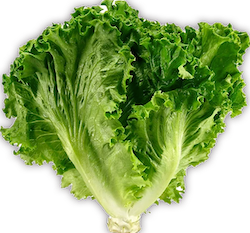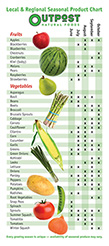Clean Greens

Keep it clean when handling green
Get plenty of green foods in your daily diet! They are chock full of essential nutrients to help maintain good health, including antioxidants to help build a strong immune system, an array of vital minerals for strong bones and a balanced nervous system, folate which is helps support the body during big growth spurts (think pregnancy, infancy and adolescence), and flavinoids which help reduce the risk of cancer. And, well, greens are just darn tasty, especially during the growing season when there is an abundance of local.
Safe handling of greens
Our food industry can be large and complex. Leafy green foods have the propensity to harbor food borne pathogens like Listeria monocytogenes if not handled or stored properly. Our farmers and vendors work hard to ensure that green foods are handled properly according to USDA guidelines at the farm, during transportation and at the point of packaging. The produce experts at Outpost apply good organic retailing practices for all fresh produce and extend safe food handling practices when setting green foods out on the retail floor.
However, even after all the safety cross-checks from farmer to retailer, cross-contamination can happen innocently - at home.
So what are consumers supposed to do? Good news! Following these simple guidelines will help you keep your green foods happy and snappy!
Wait before you wash
Hold off on washing greens until you are ready to eat them. If you wash them too early, they can sit in their own water. This can encourage early rot and may attract bacteria.
Wash these greens right before you eat them: head lettuce, kale, collards, chard, bulk salad greens, bulk spinach, parsley, cilantro, prepackaged sprouts
Bagged lettuce is ALREADY washed
Bagged and pre-packaged lettuce and salad mixes have already been triple washed before packaging. Washing them again runs the risk of cross-contamination based on your own kitchen practices. Just go ahead and plate them up - they are ready to eat!
Always practice good kitchen hygiene
An ounce of prevention of worth a pound of cure. Keeping a clean kitchen can be one of your best defenses for preventing cross-contamination of food borne pathogens.
- Always thoroughly wash your hands before preparing food
- Store food properly (see Keeping Produce Fresh)
- Cook food thoroughly - especially meats
- Thoroughly was fruits and vegetables just prior to consuming
- Only defrost food in the fridge, never on the counter (lethal bacteria multiply between 40 degrees and 140 degree Fahrenheit)
- Thoroughly keep your kitchen clean and sanitized - counters, dish drainers, utensils, cutting boards
- Replace brushes and sponges with wash cloths that can be laundered regularly
- Keep hot foods hot and cold foods cold
- When in doubt, throw it out
- Regularly sanitize your sink - fill will warm or hot water, add a small amount of bleach and let sit for 5 minutes
- Avoid cross-contamination - keep separate cutting boards for meat and produce, and thoroughly wash hands immediately after handling raw meat
- Regularly wash out your fridge and freezer with warm soapy water
- If possible, invest in a garbage bin with a step-lid system








